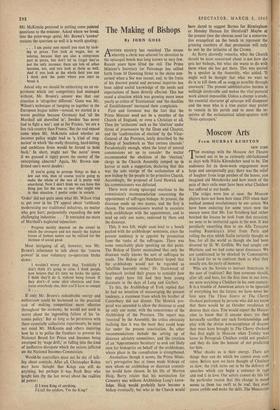The Making of Bishops
By JOHN GOSS
ANOTHER mystery has vanished. The means Ink whereby a cleric was selected for elevation to the episcopal bench was long known to very few. Recent years have lifted the veil. The Prime Minister's Secretary for Patronage has sallied forth from 10 Downing Street to the shires con- cerned when a See was vacant, and, to the fruits of his discreet postal and personal inquiries has been added useful knowledge of the needs and expectations of those directly affected. This has eased a situation which was growing more tense yearly as critics of 'Erastianism' and 'the shackles of Establishment' increased their complaints.
First and foremost was the fact that the Prime Minister need not be a member of the Church of England, or even a Christian at all.
Then the 'archaisms' such as the 'election' under threat of praemunire by the Dean and Chapter, and the 'confirmation of election' by the Vicar- General of the Province, lately described by the Bishop of Southwark as 'that curious charade.'
Paradoxically enough, when the latest of several commissions set up to consider the matter recommended the abolition of the 'election,'
clergy in the Church Assembly jumped up in horror at such a suggestion, declaring that this was the sole vestige of the acclamation of a new bishop by the people in the primitive -Church. Accordingly, the proposal of Lord Howick and his commissioners was defeated.
There were strong episcopal reactions to the commission's recommendation concerning the appointment of suffragan bishops. At present, the diocesan sends up two names, and the first is chosen. The commissioners wanted to associate both archbishops with the appointment, and to send up only one name, endorsed by them and the diocesan.
This, it was felt, might soon lead to a bench packed with the archbishops' nominees, since the present tendency is to appoint by promotion from the ranks of the suffragans. There was some remarkably plain speaking on this point.
The Bishop of Exeter maintained that only the diocesan really knows the sort of suffragan he needs. The Bishop of Manchester hoped that the archbishops would not be regarded as 'infallible heavenly twins.' Dr. Stockwood of Southwark invited their graces to consider how they might have felt had they been young diocesans in the days of Lang and Garbett.
To this, the Archbishop of York replied that he had no intention of encouraging the present tendency, a statement from which his brother of Canterbury did not dissent. The Howick pro- posal was amended to allow the diocesan to send up only one name, with the concurrence of the Archbishop of the Province. The report was 'received' by the Assembly, the critics obviously realising that it was the most they could hope for under the present constitution. Its other recommendations include the setting up of diocesan advisory committees, and the creation of an 'Appointments Secretary' to seek out likely men for bishoprics on behalf of the archbishops, whose place in the consultation is strengthened.
Anomalous though it seems, the Prime Minis- ter's prerogative has at times made bishops of men whom no archbishop or diocesan commit- tee would have chosen. In his life of Mervyn Haig, Barry relates that his nomination for
Coventry was without Archbishop Lang's know- ledge. Haig would probably have become a bishop eventually, but who in the Church would have dared to suggest Barnes for Birmingham or Hensley Henson for Hereford? Maybe at the present time the obvious need for a conserva- tive evangelical on the bench to represent the growing numbers of that persuasion will only be met by the initiative of the Crown.
As Barry shrewdly remarks, what the Church should be most concerned about is not how she gets her bishops, but what she wants to do with them when she has got them. This was quoted by a speaker in the Assembly, who added, 'It might well be thought that what we want to do is to kill them off as soon as possible through overwork.' The present administrative burden is wellnigh intolerable and makes the vital pastoral work almost impossible. Unless a change is made, the essential character of episcope will disappear and the man who is a true pastor may prefer to remain in his parish and to meet the in- quiries of the ecclesiastical talent-spotters with 'Nolo episcopari.'


































 Previous page
Previous page